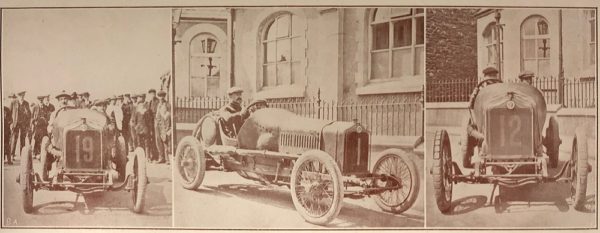
These three Minervas won the team prize at the 1914 Isle of Man Tourist Trophy by taking 2nd, 3rd and 5th places. The drivers are, from left to right, Riecken, Porporato and Molon. The race was run on the two days of 10th and 11th June, with 8 laps a day of the 37-mile circuit giving a total of around 600 miles. It was won by Kenelm Lee Guiness on a TT Sunbeam, Louis Coatalen’s straight copy of the 1913 Coupe de l’Auto Peugeot with Ernest Henry’s twin overhead cam engine.
The twin-cam Peugeot engine inspired not only Coatalen to enter cars with such an engine layout in the 1914 Tourist Trophy, but also Humber and Vauxhall. Such was its radical improvement in output, Delage, Nagant, Sunbeam and Vauxhall, as well as Peugeot, used the same type of power unit in their 1914 Grand Prix cars.
But Minerva were in 1914 wedded to the sleeve valve. The race report stated that the Minervas did a grave disservice to the reputation of this valve system by over-lubricating their engines, which created excessive smoke and made passing them a problem for other competitors. The only detail we can find for the competition between the Sunbeam and the Minervas is that KLG finished on the second day 20 minutes ahead of the second placed car, Reicken’s Minerva. Only six cars out of the twenty-two starters finished.
Picture courtesy of the Richard Roberts Archive







Leave a Comment